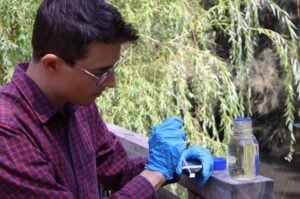Saturday, 17 January 2026
Sustained interventions boost aquaculture and nutrition security in Myanmar
The study founds significantly higher dietary diversity – a reflection of improved food security – in those producers who adopted BMPs and received nutrition-related training Sustained interventions to promote best…

The study founds significantly higher dietary diversity – a reflection of improved food security – in those producers who adopted BMPs and received nutrition-related training
Sustained interventions to promote best management practices (BMPs) and improve nutrition have shown promising results among small-scale aquaculture producers in Myanmar, according to a new study from the CGIAR Initiative on Aquatic Foods.
Small-scale aquaculture is critical to food security in Myanmar and, as one of the fastest-growing agri-food sectors in the world, it has great potential to support rural development in the country and elsewhere. However small-scale fish farmers often have limited access to the technologies and information that could help improve production, earnings, and household nutrition.
The study looked at whether interventions to support BMPs in aquaculture – such as the use of the most appropriate fish species and production sites – together with the provision of nutrition training had improved pond productivity, livelihoods and food security for small-scale fish farmers in the country’s Sagaing and Shan regions.
Focusing on 379 producers involved in the Myanmar Sustainable Aquaculture Programme (MYSAP Island) intervention – implemented by WorldFish, with support from the German Development Corporation (GIZ) – it considered seven variables: fish yield, fish revenue, revenue per acre, household income, weekly fish consumption, and dietary diversity. Crucially, researchers also examined whether the BMP interventions and nutrition training length was important.
They found significantly higher dietary diversity – a reflection of improved food security – in those producers who adopted BMPs and received nutrition-related training. Notably, they also found significant improvements in almost all variables if producers were exposed to BMPs and nutrition-sensitive training for two years, compared to those who received only one year of exposure and control groups who received none. The researchers state that this is likely to be the combined result of continual practice (learning-by-doing) and learning from others, with access to support from extension services, which help to build farmers’ skills and confidence over time.
Technology
Bringing PFAS testing to the point of need
Jan 16, 2026 | Australia
Study finds Magtein enhances memory, reaction time and heart health markers
Jan 15, 2026 | Company News
Walmart and Google turn AI discovery into effortless shopping experiences
Jan 15, 2026 | Company News
Food Testing
Bringing PFAS testing to the point of need
Jan 16, 2026 | Australia
IMCD opens a Food & Nutrition Laboratory in Cologne
Jan 08, 2026 | Company News
La Trobe University Develops Portable Biosensor to Detect PFAS in Water
Jan 08, 2026 | Australia
More Popular
Amar Pure Gold to invest Rs 250 Cr in Agro-Food Park in Himachal Pradesh
Jan 16, 2026 | Company News
Franke launches new A Line in Southeast Asia and opens regional flagship showroom in Singapore
Jan 16, 2026 | Beverages
EXBERRY plant-based colour supplier GNT earns top sustainability award
Jan 16, 2026 | Awards





